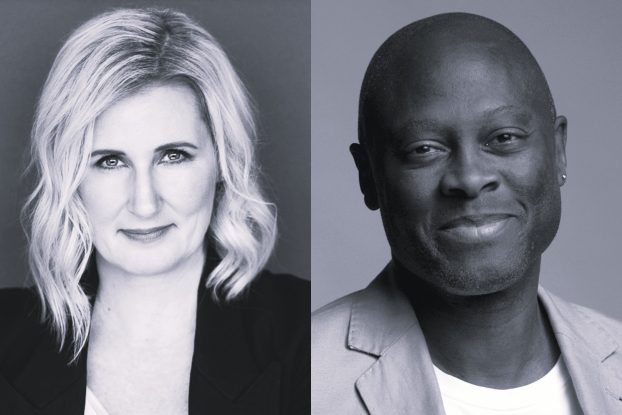
Vancouver Island Brewing’s sales were down 25% in a packed craft beer market. With a cause-marketing approach to raise awareness of endangered killer whale populations, 123w designed special-edition four-packs. Sales bounced back over 30% and the project has become an annual event.
Mooren Bofill wanted a change. As an executive-level creative and designer, she’d spent the last five of her 13 years in the industry building the design arm of a well-respected, network-owned creative agency. The work was great but, in her words, it was “beholden to structures and hierarchies beyond my control.”
Then she spoke with Scot Keith, co-founder, president and CEO of One Twenty Three West. “He asked me to join 123w and emphasized: ‘We want to use thinking and creativity to build business and do things differently.’” A lot of independent agencies say things like that, but Bofill saw that this was a business built like no other. She joined the agency in October of this year.

In a world where people identify as vegetarians, pescatarians and the like, 123w built the idea that if you like good food, you’re a “Spotitarian,” celebrating a BC-born restaurant chain with menu options for everyone. Ipsos reported 96% of those surveyed linked the word with the brand, and purchase intent increased 33%.
Much has been made of the 40-person agency’s humble beginnings in 2013: founders Keith, Jeff Harrison, Rob Sweetman and Bryan Collins crammed some desks into a garage in Vancouver. They soon moved into an industrial laundromat, and now have a few “b-grade buildings” in Toronto and Vancouver with plywood flooring. Where some might play up this charming origin story, the agency’s pragmatic approach to business means it makes no bones about its un-flashy working spaces.
“We keep overhead low,” says Jonathan Longworth, chief operating officer and partner. “We operate on a low overhead, high talent model. We’ve all come from big shops where you might have 25% going to overhead, whether that’s money going to head office or paying for big offices. That’s leaving only 75% to build a great team. We run about 7% overhead, which leaves over 90% to build a kickass team,” Longworth says.

The CAA’s most successful campaign to date was 123w’s public service “Do Anything But Drive.” When edibles became legal, CAA wanted roads to stay safe. The agency took the positive reinforcement route (which research showed was more effective), garnering millions of earned media impressions. Other auto clubs have since picked up the campaign.
Scanning the CVs of the agency’s talent pool shows that it does kick ass. The flat structure is populated with experienced creative and account pros who could lead departments at most agencies. Here, most have CD or management titles but still do the hands-on work required to build effective campaigns.
“No one has anything to prove or needs to build a book,” Longworth says. “Everyone understands that our skills are best used by solving client problems. There’s no ‘creativity for creativity’s sake’ here.”

At first, the random words on Mt. Pleasant Mural District’s OOH ads in Vancouver seem incoherent. “You’ll get it when you see it,” is the only clue. But the ads were placed near gorgeous works of street art that, once discovered, had pedestrians nodding in recognition. Suddenly, “romantic forest brain face” makes sense.
That grounded, get-the-work-done mentality extends to how the team works with brands. 123w has stripped away much of the pomp and ceremony of typical client interactions. There is no initial briefing followed by weeks of isolation and ending in a grand unveiling of three “Big Ideas” from which the client must choose one.
“Our first presentation is a working session,” Longworth says. “We get our clients in to see a lot of ideas early in their development.”
This actually gets work done faster. “Too often, agencies tell their clients to just give them what they need and then get out of the way,” Longworth says. “That puts clients in a difficult
situation. It doesn’t leverage their knowledge about the business.” Longworth says many agencies feel they have to shelter clients from work in progress. “The client might see stuff that sucks, but if we’re all in this together, let’s get feedback early and figure out how to push it forward.”
“When you put experienced creatives and account people in a room with experienced marketers, it’s shocking how ego-free that discussion is,” Bofill says. “You toss out the ineffective ideas, nurture the good ones and turn stuff around quickly.”
When Bofill saw this model in action, she knew she’d made the right career move. She enjoys the dichotomy of having the autonomy and responsibility of a business leader while getting her hands dirty on the front lines. As a creative director and partner, she does the legwork of crafting campaigns on some accounts while serving in an oversight role on others.

Tourism British Columbia wanted to generate referrals for its regional partners, and the agency leveraged the province’s vast wilderness spaces to get the job done. A content series in Outside magazine alongside short-form videos drove 770,000 referrals to regional travelers.
“Every single person in the agency – and I’ve spoken with them all – feels valued and truly enjoys their job, which I think speaks volumes about the culture,” she says. “In an industry often criticized for prioritizing the bottom line, celebrating fame and fostering ego, 123w is a needed disruption where empathy, people and culture are the focus.”
CONTACT:
Scot Keith
President and CEO
scot@123w.ca
The 2021 Indie List:
Zulu Alpha Kilo: Leading the way to 2030 … and beyond in a brave new world
Giants & Gentleman: ‘Grow or die’ but with integrity
Proof strategies: Where culture comes first
Uphouse: Taking in-house to the next level and doing well by doing good
Target: The secret sauce to longevity, 40 years on a road less travelled
Elemental: The human connections agency
Agnostic: Balancing intuition and reflection through better thinking
The French Shop: Making national campaigns make sense for Quebec
doug&partners: Creativity for commerce




















